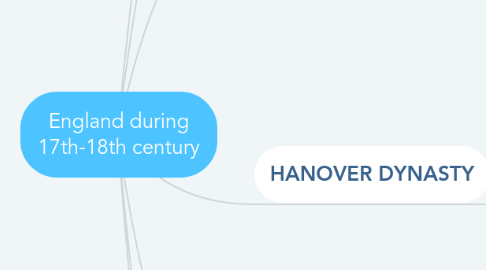
1. TUDOR DYNASTY
1.1. Henry VII
1.2. Henry VIII
1.2.1. Catherine
1.2.2. Anne Bolene
1.3. Mary I
1.4. Elizabeth I
1.4.1. childless
1.4.1.1. the dynasty ended
2. James II
2.1. second wife catholic
2.1.1. Puritans didn't want a catholic
2.1.1.1. end of the dynasty
3. STUART DYNASTY
3.1. James I
3.1.1. son of Mary Stuart (Queen Scotland)
3.1.1.1. cousin of...
3.1.2. the first king ENGLAND+SCOTLAND
3.2. ROUNDHEADS (=parliamentarians) VS ROYALISTS = CIVIL WAR 1642
3.2.1. Leader of Roundheads: Oliver Cromwell Leader of Royalists: Charles I
3.2.1.1. End of the war: king arrested + executed
3.2.1.1.1. OLIVER CROMMWELL CONTROL OF LONDON ---> PERIOD WITHOUT A KING/QUEEN.... SORT OF REPUBLIC
3.3. Charles I
3.3.1. he wants a totalitarian power
3.3.1.1. BUT
3.3.1.1.1. governament strong: PURITANS (=they want to purify England)
3.4. Charles II
3.4.1. immoral
3.4.1.1. during his reign
3.4.1.1.1. Bubonic Plague 1665 + The Great Fire 1666
4. HANOVER DYNASTY
4.1. Mary II (daughter of James II) + William of Orange
4.1.1. Glorious Revolution (no blood)
4.1.2. time of economic progress
4.1.2.1. London: financial capital
4.1.2.2. Bill of Rights 1689: agreement of Parliament
4.1.3. Religious pluralism
4.2. Queen Anne
4.2.1. sister of Mary II
4.2.2. Act of Union 1707
4.2.2.1. Scotland united with England
4.2.3. The Wighs & The Tories
4.3. George I
4.4. George II
4.4.1. house for the pime minister
4.4.1.1. in Westminster, 10 Downing Street
5. THE WIGHS & THE TORIES
5.1. Whig Sir Robert Walpole
5.1.1. power for over 20 years
5.1.2. Trade stimulated
5.1.2.1. 1723 coffe + chocolate TAXES
5.1.3. 1726 accused of corruption
5.2. Whig William Pitt
5.2.1. prime minister from 1766
5.2.2. mercantilist policy
6. THE GOLDEN AGE = AUGUSTAN
6.1. Period of stability
6.2. period of traditionalism+elegance
6.3. society: materialistic
6.4. political institutions: hereditary, privileged
6.5. Puritans: rejected
6.6. free and open age
6.6.1. optimism + hope
